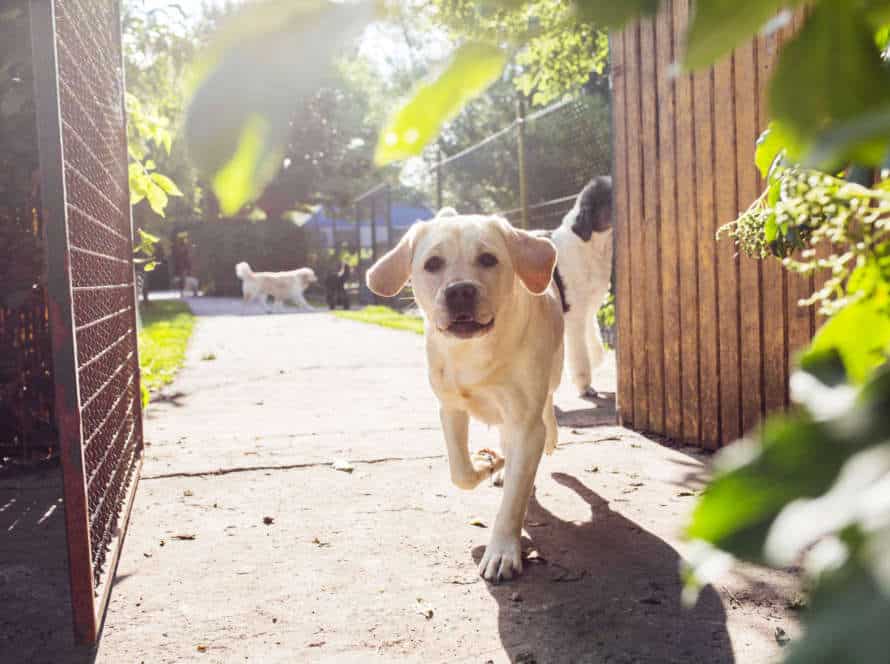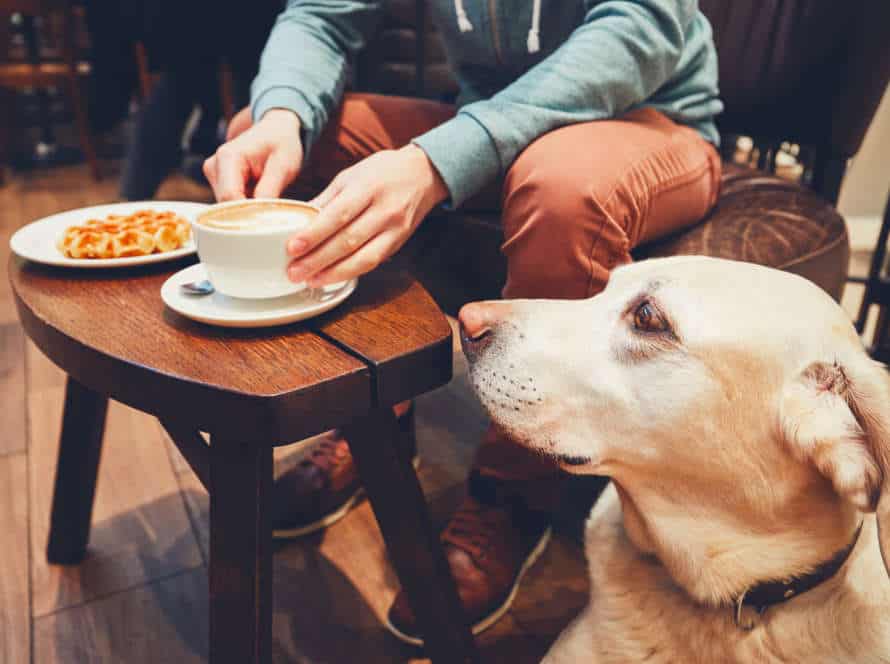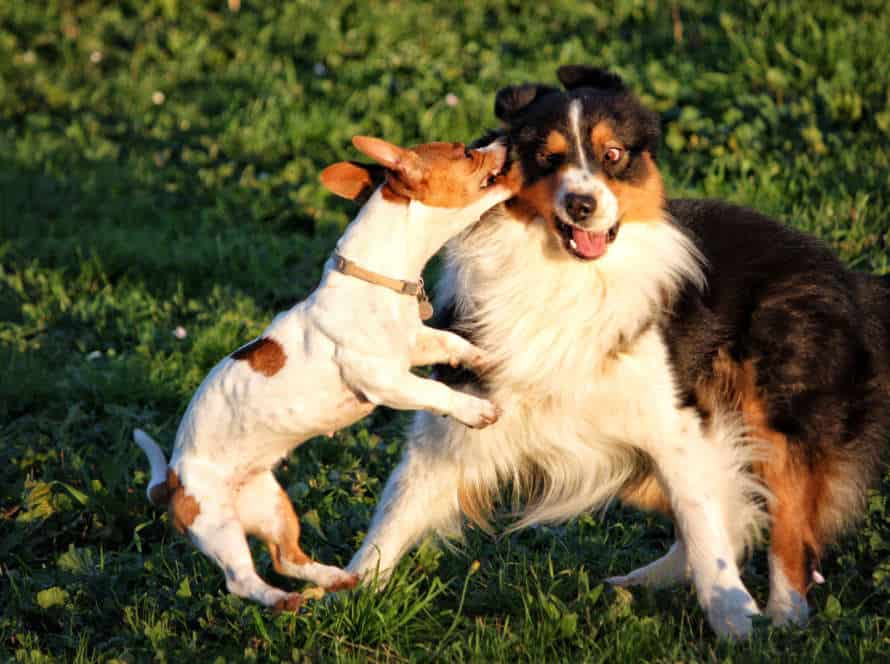Boosting Your Shy Puppy’s Confidence Through Play
Want to help your shy pup gain confidence? Here’s how!
- Choose an environment suited to play safely and comfortably.
- Introduce a toy that your pup loves, like a squeaky one or a ball.
- Play games like tug-of-war, catch, or hide-and-seek to encourage interaction.
- Reward pup with treats & positive reinforcement for good behavior.
- Gradually introduce pup to other dogs/people, under supervision.
Pro Tip: Consistency is key! Set regular playtime routines & stick to them!
Understanding Shyness in Puppies
Puppies can be shy. Fear is usually the cause. If they meet new things, they often get nervous. The signs of shyness are cowering, shrinking, hiding, and barking. Knowing these helps you help your puppy. Here are tips to make them less shy and more confident:
- Expose your puppy to a variety of experiences in a controlled and positive way.
- Don’t force your puppy into situations that scare them.
- Use positive reinforcement training techniques to encourage good behavior.
- Be patient and don’t expect overnight results.
- Finally, seek professional help if your puppy’s shyness is extreme or interfering with their quality of life.
The causes of shyness in puppies
Genetics can make pups timid. Lack of socialization can too. Fear and anxiety caused by traumatic experiences or loud noises can make them shy. Separation and noise anxieties add to it. To help your shy puppy, encourage play and positive interactions with other dogs and people. Socialization classes can help too. Patience and understanding will help them learn to deal with the world.
How to identify shyness in your puppy
Puppies can be shy, and recognizing the signs is important for their owners. Signs of shyness include:
- Avoidance behavior- puppy may try to avoid interaction.
- Nervousness- trembling, panting or whining in stressful situations.
- Fearfulness- loud noises or sudden movements can cause fear.
- Timidity- puppy may face away or hide behind its owner when confronted with something new.
If you spot these signs, socialize your puppy with other calm animals. Introduce them to new people and places slowly. Use positive reinforcement techniques to build their confidence.
Pro Tip: Socializing and gentle encouragement can help the shy puppy grow into a confident doggo.
The dangers of ignoring shyness in your puppy
Puppies can be shy, which can show in hiding, panting, growling, and more. Sadly, ignoring shyness can lead to poor self-esteem, aggression, and trouble handling new things. Here’s how to help your pup gain confidence through play:
- Create a safe spot: Make a comfy area with toys and treats for your puppy to go to when feeling anxious.
- Socialize your pup: Introduce your pup to new people, pets, and places in a controlled way. Increase exposure to new situations gradually.
- Reward good behavior: Praise and reward your pup for positive interactions with new people, animals, and environments.
- Play games: Play interactive games with your pup, like hide-and-seek or fetch. This builds trust and boosts confidence.
Pro tip: Patience and consistency are key when dealing with shyness. With time and positive reinforcement, your puppy can become an adult dog with no shyness.
Benefits of Play For Shy Puppies
Playing with your bashful pup can help them construct their trust and assist them with connecting better in social circumstances. Socialization and play are essential for a pup’s improvement, and fooling around with them can give numerous advantages. This article will talk about the positive impacts that play can have on a shy pup and why it is significant for their development and growth.
How Play Builds Confidence in Your Puppy
Playtime is essential for building puppy confidence! It helps them explore, learn, and socialize. Plus, it exercises them physically and mentally.
Here are some of the benefits of playtime for shy pups:
- Reducing anxiety- Playtime provides a safe, positive space where they can learn at their own pace.
- Increasing sociability- Playtime lets them meet other dogs and humans, which helps build social skills & confidence.
- Promoting physical & mental health- Exercise for body and mind leads to better health.
- Positive reinforcement- Rewards and reinforcement increase confidence & self-esteem.
The role of play in improving socialization
Play is an important way to help shy puppies with socializing and increasing their confidence. Playtime is a great chance for shy puppies to get closer to their owners, trust them more and create a positive relationship with socialization.
Benefits of play for shy puppies:
- Builds Confidence: If you let your shy puppy get used to new toys and games slowly, it can help them become more confident.
- Makes Socialization Positive: When you play with your puppy in social situations, they can gain a positive attitude towards socializing and get used to meeting new people and pets.
- Strengthen Bond With Your Puppy: Playtime is the best time to strengthen the bond between you and your puppy and make them feel safe.
It’s important to give your shy puppy plenty of different toys, games and play areas, so they can get the most out of playtime. Create safe and fun play environments for them, so they can learn essential social skills and become more confident while having fun.
Pro-tip: Remember to choose toys that are suitable for your puppy’s age and size.
The effect of play on reducing fear or anxiety in puppies
Playtime is an awesome way to ease fear and anxiety in shy puppies. Here’s how it can help:
- Mental stimulation: Playtime isn’t only physical activity. It also provides mental stimulation, which is necessary for good health.
- Socializing: Playtime can help shy puppies become more at ease around people. This leads to more confidence and less worry.
- Bonding: Playtime builds the connection between pup and parent. It helps create trust and security for the puppy.
- Reducing boredom: Playtime distracts shy puppies from their fears, and it helps decrease restlessness.
Make playtime fun, but not too intense. Start with short playtimes and increase the time as your pup gets braver. Praise and treats are great rewards for good behaviour.
Pro tip: Puzzle and fetch toys are great for shy puppies as they involve mental and physical activity.
Types of Play to Build Your Puppy’s Confidence
For timid pups, playing is a wonderful way to boost their self-belief. Through play, puppies can discover the world around them and express their feelings in a safe and calming atmosphere. There are numerous types of play to aid your pup with gaining confidence. In this article, we will look into some of the most prevalent and useful ways of playing to improve your shy pup’s self-confidence.
Interactive Play with Toys
Interactive play with toys is a great way to help your shy pup feel more secure. It also increases the bond between you both. There are different types of play you can engage in.
- Tug of War: Get a rope toy. Hold one end and let your pup hold the other. Gently tug back and forth. Use a cue word, like “tug”, to signal the start and end of the game.
- Hide and Seek: Hide treats or toys, and encourage your pup to sniff them out. Start with easy hiding spots and make the game more challenging as they get more confident.
- Fetch: Play fetch with your puppy. This helps develop their coordination, concentration, and confidence. Start by throwing the toy a short distance and gradually increase it.
Always supervise your puppy during playtime. Choose toys that are safe and appropriate for their age and size.
Play Fighting and Wrestling with Their Owners
Engaging in play fighting and wrestling with your pup can be a great way to strengthen your bond and build confidence. It’s important to mix things up though! Here are a few fun alternatives:
- Tug-of-war: Helps your pup understand when it’s okay to assert themselves.
- Fetch: Teaches motor skills, indoors or outdoors!
- Hide-and-seek: Your pup searches for you and discovers new places.
- Puzzle toys: Problem-solving skills + treats = confidence boost!
Don’t forget to keep an eye on your pup during playtime for safety.
Pro tip: Change up play routines to keep their mind active and growing.
Play Dates with Other Pups
Puppy play dates are an awesome way to give your pup a confidence boost and help them learn social skills. Ideas for playtime:
- Tug-of-war – Teaches pups they can hold onto something, even when someone tries to take it away.
- Fetch – Puppies learn to get and bring back items. They feel accomplished completing the task.
- Agility games – Set up a mini obstacle course to help puppies with balance, coordination and self-esteem.
- Chasing games – Great for socializing and self-confidence, plus it gets them exercising.
Always make sure to supervise the playdates and ensure your puppy is comfortable. The right kind of socializing will make them well-rounded and happy.
Creating a Safe and Stimulating Play Environment
Raising a shy pup? Get them used to new places, people, and things! One way: create a stimulating play environment. Introduce your pup to unfamiliar situations and people with play. This will help them feel more confident. Here’s how to create a play environment that boosts confidence:
Importance of choosing the right venue to play
Choosing the right venue for playtime with your shy pup is key. It sets the stage for a safe, stimulating environment that helps build their confidence.
Why?
- Safety: Certain venues, like dog parks or crowded streets, may be too intense for a timid pup. Instead, pick a secure, enclosed spot like a fenced backyard or inside a playroom. That way, your pup won’t be at risk of harm or distress.
- Stimulation: All pups need stimulation, but an overly-stimulating setting can overwhelm a shy one. Select a calmer place, like a familiar backyard or designated play area, to provide the necessary stimulation without startling them.
- Confidence: Playtime is a chance to nurture self-confidence and social skills, but a shy pup may need extra support and reassurance. A safe and stimulating play environment can help them gain confidence and create positive associations with playtime.
Pro tip: Always supervise and gradually introduce new environments to your shy pup. That way, they’ll gain confidence over time.
Creating a structured play routine
Structure playtime for your shy pup and their confidence will soar. Here are some tips to make it safe and stimulating:
- Pick a peaceful, cosy spot to play.
- Set up a daily routine.
- Give treats and praise for good behaviour.
- Start with gentle games and build up.
- Keep an eye on their safety.
Pro Tip: Stay patient and consistent. Building confidence takes time, so enjoy the small victories!
Using positive reinforcement during play
Positive reinforcement during playtime is a great way to make your timid pup more confident and friendly. Like humans, dogs respond best to positive reinforcement when they are learning. Giving positive reinforcement during playtime builds trust between you and your pet.
Here are some tips for using positive reinforcement:
- Give treats when your puppy does something good, like obeying commands or bringing back a toy.
- Stay patient and don’t get angry. Dogs can sense your feelings, so if you get mad, they may become scared or withdrawn.
- Play with toys and games that your puppy enjoys and take breaks often to avoid over-exerting your pet.
- Praise your pet with a positive tone and reward them for good behavior.
With patience and consistency, positive reinforcement during play can turn a shy, anxious puppy into a confident and cheerful friend.
Final Tips for Boosting Your Shy Puppy’s Confidence Through Play
Playing with your timid pup? A great way to make ’em confident. Playing with games and toys, it helps your pup learn how to interact with people and other animals.
Here’s a few extra tips to help your shy pup out:
- Boost their confidence even more!
Knowing when to stop playtime
It’s vital to recognize when it’s time to pause playtime with your timid pup. This will help keep them from feeling overwhelmed and anxious. Here are a few signs that suggest it’s time for a break:
- Yawning: When your puppy starts yawning often during playtime, they may be stressed and need some rest.
- Lip licking: Dogs usually lick their lips when they’re anxious or uneasy. If you spot your pup doing this, it could be time to slow down or quit playing.
- Cowering: If your puppy begins cowering or concealing themselves during playtime, it’s a sign that they are overwhelmed and need a pause.
- Stiff body language: If your pup’s body becomes rigid or tense, it could be an indicator that they are feels anxious or uncomfortable.
As a general rule, ensure playtime sessions are brief and enjoyable. It’s better to have more frequent, shorter playtimes to stop your shy pup from being overwhelmed.
Monitoring progress and setting goals
Keep tabs on your timid pup’s progress and create attainable goals during playtime to boost their self-assurance and refine behavior. Here are some hints to help:
- Check your pup’s body language during playtime. Anxious? Aggressive? Disinterested? Change the activity or surroundings accordingly.
- Short, frequent playtimes stop your pup from being overwhelmed.
- Set goals your pup can manage, taking into account their individual needs and capabilities. Upping the challenge as they become more confident.
- Treats, compliments, and strokes are great ways to reward good behavior through positive reinforcement.
- When struggles arise or you feel overwhelmed, it’s wise to consult a professional dog trainer.
- Pro Tip: Bear in mind each timid pup has a unique character and history. Patience, regularity, and understanding are key to nurturing their trust and assurance.
Incorporating playtime as part of your regular routine
Boost your shy pup’s confidence and social skills by incorporating playtime into your regular routine! Here are some tips to make the most of it:
- Start slow. Begin with short play sessions and gradually increase their length and intensity as your pup gets more comfy.
- Choose the right toys. Consider their age, size and breed when picking out toys that are safe and attractive.
- Make it interactive. Use toys such as tug ropes or interactive puzzles, so you can join in on the fun.
- Keep it positive. Reward your pup’s playful behavior with treats, verbal praise and belly rubs.
- Pay attention. Monitor your pup for signs of being overwhelmed or scared, and adjust accordingly.
With these tips, you can help your shy pup become a more social and happy companion in the long run!
Frequently Asked Questions
1. How can play improve my shy puppy’s confidence?
Playing with your shy puppy can help them build trust in you and the world around them. It also allows them to practice new skills and learn to interact with others, boosting their overall confidence.
2. What types of toys are best for a shy puppy?
Interactive toys that stimulate your puppy’s senses can be great for building confidence. This can include toys with textures, sounds, or that encourage problem-solving. Avoid toys that are too overwhelming or scary for your puppy.
3. How often should I play with my shy puppy?
It’s a good idea to schedule regular play sessions with your shy puppy, but also be flexible and allow for spontaneous playtime as well. Aim for at least two 15-20 minute sessions per day.
4. Can I use treats during playtime to boost my puppy’s confidence?
Yes, using treats during playtime can be a great way to reward your puppy for positive behavior and encourage them to continue interacting with you and their toys.
5. What if my shy puppy doesn’t seem interested in playing?
Be patient and try different types of toys and activities to find what your puppy enjoys. You can also try playing in a quiet and low-stress environment, such as a fenced yard or a room without distractions.
6. Can I play too rough with my shy puppy?
No, it’s important to play gently and avoid overwhelming or scaring your puppy, as this could damage their trust in you and inhibit their confidence-building progress.







